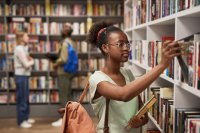A Field Trip With Lifelong Benefits
High school teachers should consider the many benefits of taking students to a local public or academic library.
Your content has been saved!
Go to My Saved Content.Students benefit in multiple ways when they go on field trips to academic, public, and even special libraries. Such excursions teach young people about the valuable services that libraries provide to both general and specialized communities, including lending material, offering classes, supporting research, preserving documents, and disseminating information.
Of course, library learning should start within the walls of schools. Research shows that providing K–12 students with a library staffed by a certified librarian enhances test scores, reading ability, and information literacy. With this in mind, while a field trip should never replace a robust, comprehensive, and well-supported school library program, it can be a helpful supplement to it.
Setting up the field trip
If you’re a school librarian, pitch the idea to a teacher, bring up the benefits of a library field trip at a faculty meeting, or suggest incorporating a library tour on an existing field trip to a college or business.
Classroom teachers can collaborate on some of these ideas with fellow teachers from their own or another department. Think about piggybacking a library field trip onto another field trip, too.
Public library
Libraries form an essential part of society’s cultural and civic fabric, and they’re critical to the health of a democratic republic.
A visit to the public library can include learning how to search the catalog, borrow materials, and use the interlibrary loan system. A librarian can explain to students the many ways libraries benefit their lives and community, and how libraries provide education and support to citizens.
In addition to providing books and movies, libraries offer adult-education opportunities, job programs, help with filing taxes, and many activities for children. These are helpful resources for all community members.
Librarians are excited to help teachers and work with students. Contact your local public librarian, who can help you plan your visit. Before you go, teach students about the important role that public libraries have played in American history.
For teachers, consider pursuing the following curriculum connections:
- Government: Civic engagement, the role of educated citizenry, how the government guides the community and offers services to the public.
- History: The public library in American history, Benjamin Franklin’s Library Company, the WPA and libraries during the Great Depression.
- English language arts: Ways of fostering lifelong reading.
College and university libraries
A visit to an academic library can help honors, AP/IB, gifted, or any college- or university-bound students appreciate how important libraries are to research, education, and postsecondary learning.
I used to bring my students to a university library within walking distance (not everyone has this ability). A research librarian explained to my students about their role in assisting instructors and students. Then, she and I gave the kids a tour of the library, emphasizing both the print and digital resources available.
Typically, I arranged this field trip while the students were in the middle of a research project. We utilized the university’s databases, and I asked that students borrow one book for their project. This gave them a taste of postsecondary research.
At the very least, think about incorporating a library tour into a college visit.
Digital libraries
Don’t worry if you can’t get a field trip planned. The internet allows students and teachers to access libraries from anywhere in the world.
The Library of Congress, for instance, offers an Education Resources page, replete with a host of digital material, presentations, “primary source sets,” and lesson plans.
Recently, several colleagues and I have been in contact with our public library’s Digital Collections Librarian, who is helping us build a collection of digitized local history materials. Reach out to your local library to see how it can bring electronic library resources to your students.
Major libraries offer library cards to state residents. For example, the Free Library of Philadelphia allows Pennsylvanians and some others to obtain a library card free of charge. Even if students can’t make it to the library, there are plenty of electronic resources they can use for research or pleasure.
Visiting librarians
Librarians in your area, be they from a public or academic library, would likely love to visit your students.
Two public librarians will soon be coming to talk to a business class at my school. The librarians will be discussing the electronic databases and resources for students studying business, as well as signing everyone up for a library card (anyone 14 and under needs parental approval).
Libraries form an essential part of society’s cultural and civic fabric. It’s therefore important for all citizens to know how to access library services, be it as a student, professional, or member of the public. First, though, become a strong and persistent advocate for your own school’s library program.
